by Ali Kayn
Paul Collins recently received the A Bertram Chandler Award for lifetime achievement in Australian science fiction. I first met Paul in a tiny second hand bookshop in suburban Melbourne. He sent me to my first convention, introduced me to my first fan artist, and fed my addiction for science fiction books. I was a little surprised not to find him at the convention, but Paul is not a fan, he is a consummate professional who has written around 150 books and 140 short stories.
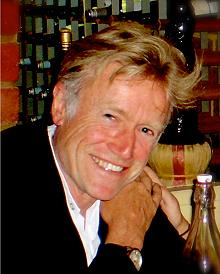
In the seventies, Paul was editing and publishing Void Publications as well as writing and selling books. Today he is the publisher at Ford Street Publishing, which has a large range of children's and young adult's titles. He has been short-listed for many awards and won the Aurealis, William Atheling and the inaugural Peter McNamara awards.
Paul's popular series include The Quentaris Chronicles (The Spell of Undoing is Book 1 in the new series), which he co-edits with Michael Pryor and The Jelindel Chronicles, The Earthborn Wars and The World of Grrym trilogy, which he writes in collaboration with Danny Willis. He recently released his adult novel, The Beckoning.
In his leisure time, Paul practices ju jitsu and taekwondo (he has black belts in both), which experience can be seen in The Jelindel Chronicles and The Maximus Black Files.

Festivale: Paul Collins is a writer, editor, publisher and bookseller, but where did you start?
"I guess the absolute start of my writing and publishing career was writing and self-publishing a western novel. Hot Lead - Cold Sweat (yes, awful title but not as bad as the book) was published in 1974. Fortunately no one I know has a copy. Even the National Library doesn't have one - they emailed me a couple of years ago asking me to send a copy! From that mini disaster I published a science fiction magazine not knowing the first thing about SF - I'd vaguely heard of some guy called Asimov. Luckily for me many heavyweights around that time came to my rescue, including A Bertram Chandler, Frank Bryning, David Lake, Wynne Whiteford and Jack Wodhams. Void Magazine did okay, all things considered. I then branched out into publishing SF and fantasy novels - in fact I published Australia's first heroic/epic fantasy novels. Unfortunately distribution was hard to get in those days so I gradually turned to writing."
Festivale: What are you concentrating on now?
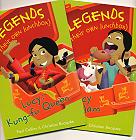
I'm writing the final Lucy Lee books for Macmillan's Legends in Their Own Lunch Box series. There are six Lucy books, with maybe more to come if the series takes off. I'm also on the promotion trail for an adult horror novel called The Beckoning (http://tinyurl.com/ny6urwy). I wrote this book in the early eighties on a manual typewriter. Luckily for me I revised it and stored it on various devices over the years such as 3.5" floppies, zip drives, CDs and USB sticks. Damnation Books released The Beckoning on 15 September. The Only Game in the Galaxy, Book 3 in The Maximus Black Files also came out this month. So now I'm on the campaign trail to promote them.
Festivale: What changes have you seen in the science fiction/fantasy genre in three decades?
Not that much, really. Robert E Howard-style fantasy has given ground to romance/fantasy - my humble opinion, of course. SF has moved along from rocket ships and space opera to steampunk, thriller and dystopian. It's much more readable now, I think. I wouldn't say that of the majority of fantasy, though. Publishers seemed fixated on weighty tomes that could be told in half the pages.
Festivale: What changes have you seen in publishing in three decades?
The Digital Age is truly upon us and as we know it's basically changed the book industry every which way possible. There are minuses and pluses. I see a minus in the fact that booksellers are closing their doors because people can get books quicker and cheaper via the internet; libraries that once bought books now can borrow from other systems - not only print but digital. So a cluster of libraries these days needs only one book to share, whereas once upon a time individually they would each purchase copies.
Authors obviously miss out on royalties, publishers miss out on sales. Via the Internet people can self-publish virtually without cost. Many of these books are unedited and poorly written. People purchase them for as little as $1 - often for free. This obviously takes away sales from writers whose careers rely on sales, it deducts from publishers and booksellers - it affects many, many more people. Pluses include getting a wider distribution for titles. For example, Amazon that would not stock my Jelindel Chronicles now promotes them. I actually received an email yesterday asking if I'd like to purchase them as a reader of fantasy novels. Print-on-Demand is great in as much that many out-of-print books can now be purchased. The downside is for everyone purchasing an old book, a newer author is missing out on a potential sale. An entire book could be written in reply to this question!
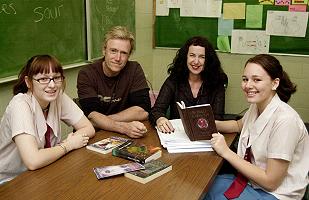
Paul Collins and Isobelle Carmody with young readers
Festivale: You are doing a lot of work in the young adults field, what is the appeal for an author/editor? What is YA?
Teen fiction shares the virtues of youth itself: passions, vividness and energy. Like adolescents, teen novels revel in drama and navigate Life's Big Questions.
YA novels typically focus on young protagonists or the themes they take up of self-discovery and the challenges of youth. Young adult readers are basically between 14 and 18. In the end, though, a YA book is any book that is either marketed to or claimed by a youth audience. Matthew Reilly is a good example. He writes airport fiction, yet is read mainly by young adults. My interest in SF and F can also be indulged here. Fantasy series such as The Quentaris Chronicles have been dominating the market since 1993, four years before the first Harry Potter novel came out. There's also a rise in intellectual YA like Marcus Zusak's The Book Thief.
Festivale: How do you balance the demands of being a publisher and being an author?
I generally have to prioritise. If there's a publishing deadline and I'm behind in editing a book, all else has to be put aside. If I'm writing a series such as Lucy Lee and the editor reminds me I still owe two books, the publishing activities have to step aside. I also run a speakers agency called Creative Net (www.fordstreetpublishing.com/cnet). When librarians email to book an author or illustrator for their school, I drop everything and get on to it immediately. So it's a constant juggling act.

Festivale: What is it like introducing new authors to the public?
It can be difficult as newcomers don't usually have many contacts, nor are they experienced speakers and are, by definition, unknown, so they don't get invited to festivals where they can sell and promote their books. I generally provide them with a list of bloggers, ask them to write articles that refer to their work and send their books to many reviewers. But there's only so much a publisher can do. These days authors/illustrators are expected to go Out There and promote themselves. Being a small press publisher, I simply can't do everything for them.
Festivale: What was the impetus for setting up the speakers' network?
To be honest, it was because speaking agencies won't take on newcomers, so I figured I'd set up my own agency to promote them. Then I realised that no librarian was going to come to my web site simply to book unknown authors. So I enlisted the help of some major authors and illustrators and now they're on board. I represent over 100 authors and illustrators such as Isobelle Carmody, Leigh Hobbs, Michael Salmon, Hazel Edwards, Archie Fusillo, Justin D'Ath and many others.
Festivale: Who do the speakers address (what groups)?
Everyone from early childhood through to young adults through to adults. I even represent comedians Michael Connell and Dave O'Neil.
Festivale: What is the attraction/advantage in schools (and other groups) having guest speakers?
It appears literacy levels are falling in schools. Authors can encourage students to write and read. They give talks and workshops. Illustrators encourage students to draw and in some cases to write. Understandably an author will carry more weight than a teacher when it comes to writing and reading. I also run literary festivals in schools. I provide ten authors and illustrators who give students three workshops throughout the day; book signings and sales; a book launch, etc. They're fun and educational.
Festivale: What do the authors gain from these events?
It's great exposure for them. Some authors also test out their new manuscripts on students, especially when it comes to humour. Is something funny, or only in the mind of the author? Workshops/talks can be great testing grounds for this.
Festivale: What plans do you have for the next decade?
More of the same, I guess. I'd love to work from a proper office rather than my home. I think that's the next big stage for me. I don't really have any time to write books these days. Maybe I'll write some Jelindel short stories - I have a novella sitting in the wings. I also have a series called Broken Magic. This is out with a publisher right now. I have one or two novels lying about that I think are publishable, but that's all I have. As mentioned, maybe I'll write some more Lucy Lee books if the series is a hit - they're not much longer than short stories.
Festivale: If you could publish a work by any author, no restrictions, who would you choose?
Probably Eoin Colfer. I'd love to have the rights to the next Artemis Fowl book.
Paul's latest book is The Only Game in the Galaxy, book three in The Maximus Black Files. A trailer for the series can be viewed at: http://www.youtube.com/watch?v=3S-eKDYqpEs
Visit Paul's websites: www.paulcollins.com.au, www.quentaris.com and www.fordstreetpublishing.com.
See also: Paul Collins answers The Usual Questions
by Ali Kayn

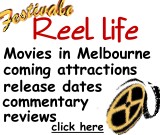
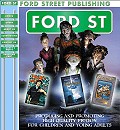
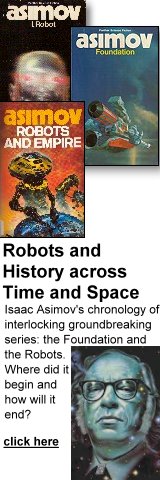

 Published in Melbourne, Victoria, Australia
Published in Melbourne, Victoria, Australia